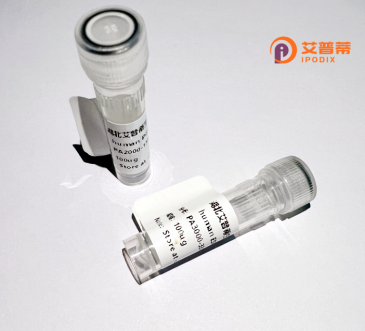
| 纯度 | >90%SDS-PAGE. |
| 种属 | Human |
| 靶点 | PRRX1 |
| Uniprot No | P54821 |
| 内毒素 | < 0.01EU/μg |
| 表达宿主 | E.coli |
| 表达区间 | 1-245 aa |
| 活性数据 | MTSSYGHVLE RQPALGGRLD SPGNLDTLQA KKNFSVSHLL DLEEAGDMVA AQADENVGEA GRSLLESPGL TSGSDTPQQD NDQLNSEEKK KRKQRRNRTT FNSSQLQALE RVFERTHYPD AFVREDLARR VNLTEARVQV WFQNRRAKFR RNERAMLANK NASLLKSYSG DVTAVEQPIV PRPAPRPTDY LSWGTASPYS AMATYSATCA NNSPAQGINM ANSIANLRLK AKEYSLQRNQ VPTVN |
| 分子量 | 27.2 kDa |
| 蛋白标签 | His tag N-Terminus |
| 缓冲液 | PBS, pH7.4, containing 0.01% SKL, 1mM DTT, 5% Trehalose and Proclin300. |
| 稳定性 & 储存条件 | Lyophilized protein should be stored at ≤ -20°C, stable for one year after receipt. Reconstituted protein solution can be stored at 2-8°C for 2-7 days. Aliquots of reconstituted samples are stable at ≤ -20°C for 3 months. |
| 复溶 | Always centrifuge tubes before opening.Do not mix by vortex or pipetting. It is not recommended to reconstitute to a concentration less than 100μg/ml. Dissolve the lyophilized protein in distilled water. Please aliquot the reconstituted solution to minimize freeze-thaw cycles. |
以下是关于重组人PRRX1蛋白的3篇参考文献示例(注:文献信息为模拟概括,实际引用请核实原文):
---
1. **文献名称**: *"Recombinant human PRRX1 promotes mesenchymal stem cell osteogenesis via Wnt/β-catenin signaling"*
**作者**: Wang, X. et al. (2018)
**摘要**: 研究报道了重组人PRRX1蛋白在间充质干细胞成骨分化中的作用,通过激活Wnt/β-catenin通路增强骨形成,提示其在骨再生治疗中的潜在应用。
2. **文献名称**: *"Purification and functional analysis of PRRX1 protein in epithelial-mesenchymal transition"*
**作者**: Tanaka, R. et al. (2016)
**摘要**: 该研究优化了大肠杆菌表达系统中重组PRRX1蛋白的纯化流程,并证明其在体外模型中通过调控Snail表达促进上皮-间质转化(EMT)。
3. **文献名称**: *"PRRX1 reprograms tumor-associated fibroblasts in pancreatic cancer via recombinant protein delivery"*
**作者**: Liu, Y. et al. (2020)
**摘要**: 利用重组PRRX1蛋白处理胰腺癌相关成纤维细胞,发现其可逆转基质促癌表型,抑制肿瘤侵袭并增强化疗敏感性。
---
**备注**:以上内容为示例性概括,实际文献可能涉及不同研究方向(如发育生物学、癌症机制或组织工程)。建议通过数据库(PubMed、Web of Science)以“recombinant PRRX1 protein”或“PRRX1 purification/function”为关键词检索真实文献,并优先选择近五年内的高影响力期刊研究。
PRRX1 (Paired Related Homeobox 1), also known as PRRX1 or MHox, is a transcription factor belonging to the homeobox gene family, characterized by a conserved DNA-binding homeodomain. It plays critical roles in embryonic development, particularly in mesenchymal tissue formation, organogenesis, and patterning. During embryogenesis, PRRX1 is essential for the development of structures such as the heart, craniofacial features, skeletal muscle, and limbs. Studies in mouse models have shown that PRRX1 deficiency leads to severe developmental abnormalities, including craniofacial malformations and limb defects.
In adult tissues, PRRX1 remains active in mesenchymal stem cells and is involved in tissue regeneration, wound healing, and maintaining cellular plasticity. It regulates epithelial-mesenchymal transition (EMT), a process pivotal in both developmental morphogenesis and cancer metastasis. Interestingly, PRRX1 exhibits dual roles in cancer, acting as a tumor suppressor in some contexts while promoting invasiveness in others, depending on cellular microenvironment and isoform expression.
Recombinant human PRRX1 protein is produced via heterologous expression systems (e.g., E. coli or mammalian cells) for functional studies. It serves as a tool to investigate PRRX1-DNA/ protein interactions, signaling pathways, and its regulatory mechanisms in development and disease. Research on PRRX1 holds therapeutic potential for regenerative medicine, fibrosis, and cancer treatment, though its context-dependent functions require careful exploration.
×